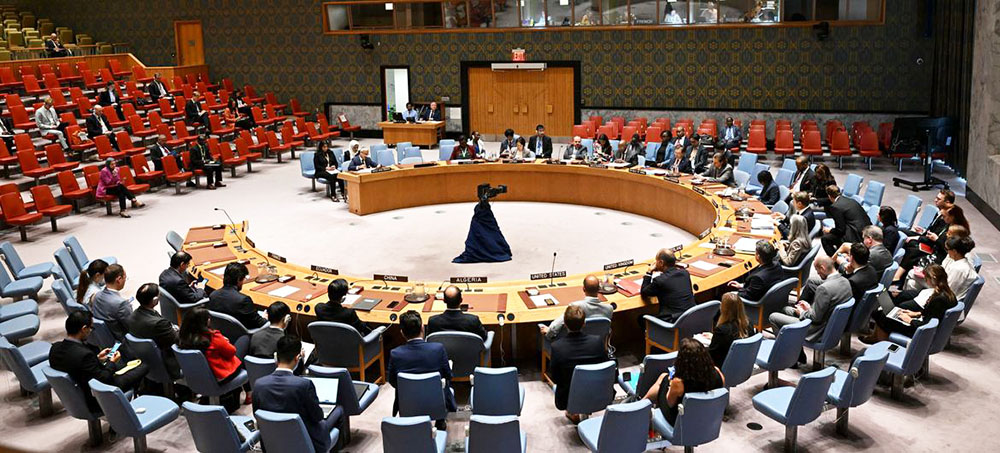
UN Calls for Decisive Action to End the Suffering of Sudanese Citizens
Moatinoon
The United Nations has reiterated the need for a ceasefire in Sudan, urging all parties to honor their commitments under international human rights and humanitarian law.
The UN Security Council held a session on Wednesday afternoon in New York to discuss the situation in Sudan. The Council received briefings from Assistant Secretary-General for Africa, Martha Pobee, and Acting Under-Secretary-General for Humanitarian Affairs, Joyce Msuya.
Martha Pobee stated that the UN Secretary-General has continuously urged the parties to de-escalate the situation in El-Fashir and spare civilians from further suffering, warning of the severe consequences of this escalation. The war in Sudan has been ongoing for 17 months, with the humanitarian situation worsening alarmingly and no end in sight.
She referenced Security Council Resolution 2736, adopted last June, which called for the Rapid Support Forces to lift the siege of El-Fashir and cease fighting immediately. "However, efforts to prevent further military escalation in El-Fashir have failed. Hundreds of thousands of civilians remain trapped in the city, facing the threat of mass violence."
She added that the Secretary-General’s personal envoy to Sudan, Mr. Ramtane Lamamra, has been in direct contact with the warring parties, including through talks held in Geneva in July. He has supported mediation efforts led by the United States, Saudi Arabia, and Switzerland in August. Recently, Mr. Lamamra engaged with Sudanese authorities during a visit to Port Sudan in late August, accompanied by UN Deputy Secretary-General, Ms. Amina Mohammed.
UN Commitment to End the Conflict
Martha Pobee said that Ramtane Lamamra will continue to coordinate international mediation efforts in Sudan to promote dialogue aimed at ending the war, with gradual progress on key issues such as halting hostilities, protecting civilians, and ensuring access to humanitarian aid.
She reaffirmed the UN’s commitment to working with all concerned stakeholders to help end the conflict.
Pobee urged Security Council members to use their collective influence to help protect those trapped in combat zones, stating that the upcoming General Assembly meetings provide an additional opportunity for both member states and the UN to double efforts to resolve this tragedy.
El-Fashir Citizens Under Siege and Shelling
Acting Under-Secretary-General for Humanitarian Affairs, Joyce Msuya, reported an escalation of fighting on a wide scale in El-Fashir and its surroundings since the end of last week. She noted that the region has witnessed heavy and continuous artillery and air shelling, putting civilians, especially women and children, at great risk. Civilian sites and infrastructure, including hospitals and camps for internally displaced persons, have been bombed.
She highlighted the "multiple threats" posed by ongoing battles in El-Fashir to the lives of hundreds of thousands of people, including more than 700,000 internally displaced persons in El-Fashir and neighboring areas.
Msuya stated that the warring parties have made no effort to protect health facilities or the civilians sheltering in them. Hospitals and healthcare centers have been repeatedly bombed, rendering them non-operational. Of the three main hospitals in El-Fashir, only one is partially functional.
She also pointed to the declaration of famine in the Zamzam camp in August, in addition to 13 other areas classified as at risk of famine. Msuya reminded the Council that Médecins Sans Frontières (Doctors Without Borders) reported in February that a child dies every two hours in the Zamzam camp.
The latest screenings conducted by Médecins Sans Frontières and the Ministry of Health between September 1 and 5 indicate that the situation is worsening. "About 34 percent of children are malnourished, 10 percent of whom are severely malnourished."
Obstacles to Delivering Aid
Msuya said that the situation is further complicated by obstacles making the delivery of humanitarian aid impossible. Since May, roads leading to the Zamzam camp and El-Fashir have been impassable due to fighting around the city and recently because of damage from heavy rains and flooding. She noted that repeated UN attempts to access the area have been unsuccessful.
However, Msuya stated, "We have not given up. We hope that with the receding of floodwaters in the coming weeks, we will be able to begin delivering supplies to El-Fashir and other areas at risk of famine."
She added that the situation in El-Fashir reflects the broader conditions across Sudan, with areas like Khartoum, Sennar, and Al-Jazira still suffering from ongoing violence. More than eight million people have now been displaced, with over two million crossing borders.
The UN official expressed deep concern over the state of humanitarian access across the country. She described the reopening of the Adré crossing from Chad as "an important step." So far, more than 100 trucks have crossed the border, delivering supplies for about 300,000 people in West, Central, and South Darfur.
Three Urgent Needs
Joyce Msuya emphasized that many lives have already been lost in this "senseless conflict." She warned that many more will die unless the Security Council and the international community take decisive action:
Demanding that the parties comply with their obligations under international humanitarian law and Security Council resolutions. Parties must refrain from targeting civilians, civilian assets, and critical facilities like hospitals.
The world must not tolerate the atrocities witnessed in West Darfur, nor allow them to be repeated in El-Fashir.
Donors must be called upon to provide the necessary resources to address this unprecedented crisis. As of September 17, the humanitarian appeal had received 1.3 billion, less than 50 percent of the required 2.7 billion.
Msuya concluded by urging the Security Council to act on the situation in Sudan, noting that the multiple high-level meetings on Sudan, scheduled during the General Assembly, provide an unmissable opportunity to end this conflict and show solidarity with the people of Sudan.

